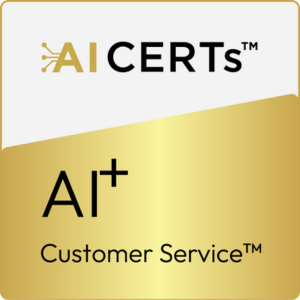Prerequisites
- Basic knowledge of customer service operations and its role in business success.
- Familiarity with digital tools and fundamental AI concepts.
- Insights into organizational decision-making processes related to customer service and technology adoption.
- Curiosity and openness to exploring AI’s transformative potential in customer service practices.
Exam Details
- Modules (8)
- Examination (1)
- 50 MCQs, 90 Minutes
- Passing Score (70% (35/50) )
Exam Blueprint
| Modules | Percentage |
|---|---|
| Introduction to Artificial Intelligence (AI) in Customer Service | 12 |
| Understanding AI Technologies | 12 |
| Data Collection and Analysis | 12 |
| Implementing AI Solutions | 20 |
| Optimizing Customer Experiences | 12 |
| Ethical Considerations and Trust | 12 |
| Future of AI in Customer Service | 12 |
| Creating an AI Strategy for Your Organization | 8 |
What you will get
High-Quality Videos, E-book (PDF & Audio), and Podcasts
AI Mentor for Personalized Guidance
Quizzes, Assessments, and Course Resources
Online Proctored Exam with One Free Retake
Comprehensive Exam Study Guide
Why AI+ Customer Service™? 10X AI-Powered Customer Experience Impact
- Master AI-Driven Support
Learn to implement chatbots, voice assistants, and automated systems for faster, smarter customer service. - Enhance Customer Satisfaction
Use AI analytics to personalize interactions, reduce response times, and improve overall experience. - Stay Future-Ready
Gain the skills businesses need as AI reshapes customer service across industries. - Boost Your Career
Open doors in high-growth sectors like e-commerce, SaaS, telecom, and banking with in-demand AI CX expertise.
Who Should Enroll
- Customer Service Executives
Use AI to enhance service delivery, automate responses, and improve customer satisfaction. - Technology Leaders
Drive transformation by embedding AI into customer service operations and strategies. - Customer Experience Professionals
Leverage AI insights to craft personalized, seamless customer journeys. - Students and Fresh Graduates
Build in-demand skills in AI-powered customer support for a competitive career edge. - Business Analysts
Utilize AI tools to interpret customer data and optimize service performance.
- Zendesk
- Freddy AI
- Octane AI
- Rul.ai
Prerequisites
Basic understanding of business operations and the role of customer service
Familiarity with digital tools and foundational AI concepts
Awareness of strategic decision-making in technology and service enhancements
Interest in exploring how AI can transform customer service and add business value
Exam Blueprint
- Introduction to Artificial Intelligence (AI) in Customer Service - 12%
- Understanding AI Technologies - 12%
- Data Collection and Analysis - 12%
- Implementing AI Solutions - 20%
- Optimizing Customer Experiences - 12%
- Ethical Considerations and Trust - 12%
- Future of AI in Customer Service - 12%
- Creating an AI Strategy for Your Organization - 8%
Frequently Asked Questions
What types of AI technologies are covered in the course
The course explores AI-powered tools such as chatbots, voice assistants, predictive analytics, and automated ticketing systems, all tailored for modern customer service environments.
Who should enroll in the AI+ Customer Service Certification
This certification is ideal for customer service professionals, technology leaders, business analysts, and students looking to build AI-driven service capabilities.
Are there practical components or real-world applications included in the course
Yes. The course includes hands-on exercises, case studies, and examples that demonstrate how AI is applied in real customer support scenarios.
How can organizations benefit from having certified AI+ Customer Service professionals
Organizations gain team members who can drive service innovation, improve response times, automate workflows, and enhance customer satisfaction using ethical AI practices.
How does the certification benefit participants in their careers
Participants gain in-demand skills that prepare them for roles in AI-enhanced customer experience across industries like e-commerce, telecom, banking, and SaaS.





